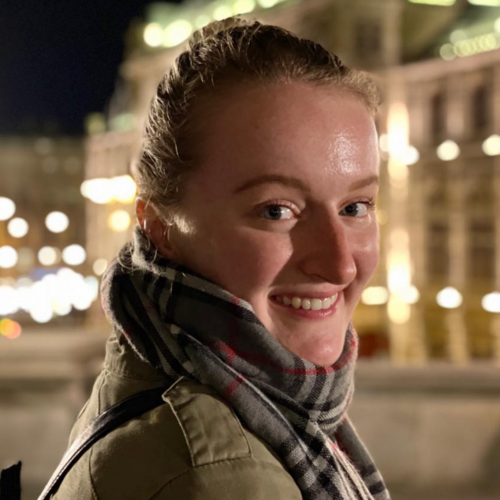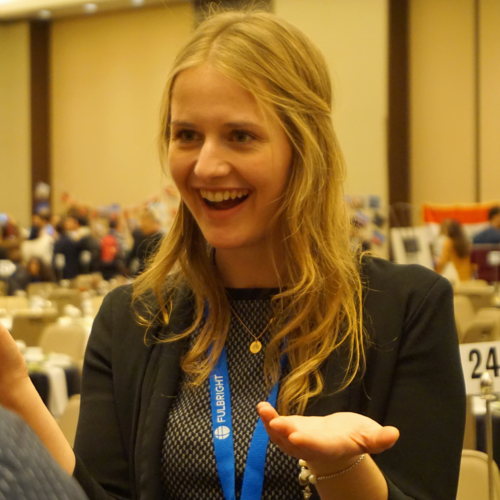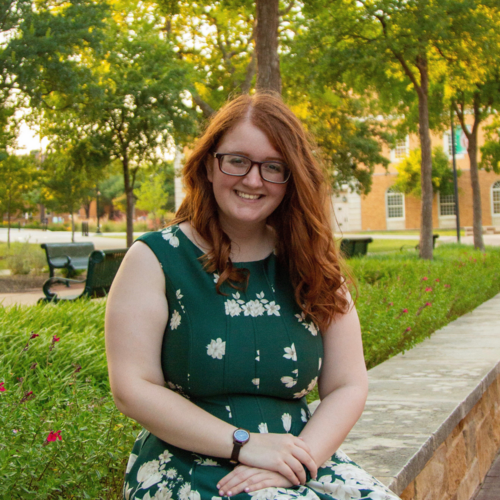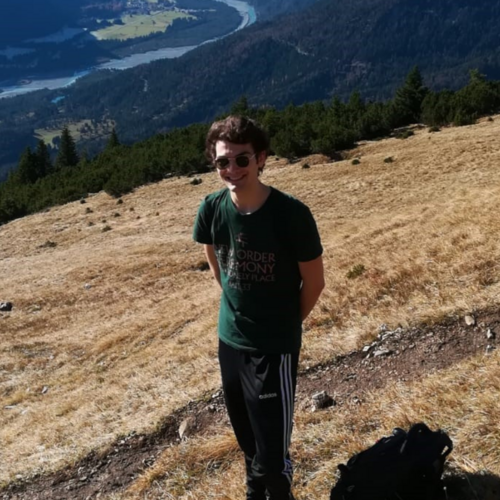One of my favorite parts about living in Austria is how my knowledge of the German language is continually challenged by different Austrian dialects and slang terms—especially while teaching English to Viennese Gymnasium students. I feel like many German-speaking internationals in Austria have a similar experience of “learning by doing” once they arrive, as some of us learn strictly Hochdeutsch in school or at university. Instead of viewing this challenge as stressful or burdensome, I love to see it as an opportunity to make me a more well-rounded communicator and “impostor Austrian.” Sure, there have been moments of frustration along the way, but I believe that this is all just part of the journey. Each new experience brings me further along this path, and I’m thankful for everyone who helps me along the way (a huge shout-out to FLTA alums and my dear friends Matthias Milchrahm and Sebastian Braunsberger!).
The beauty of language: discovering new words and dialects abroad
7 July 2021Even when we learn a language fluently, we're often confronted with unexpected challenges when speaking the language abroad—particularly when the variation of the language differs from what we've learned. We asked 2019–20 Austrian foreign language teaching assistant (FLTA) Julia Höfferer and 2020–21 US teaching assistant (USTA) to discuss their experience with language in each other's home country. Additionally, 2020–21 USTAs Kaitlin Young and John Howard share their thoughts on learning Austrian dialects.
Julia Petron, 2020–21 USTA

Besides exploring the realm of Austrian dialects, I have also encountered many new and memorable slang terms during my time here. One of the most hilarious terms I have encountered when speaking to younger Austrians is their use of the word geil to describe anything that’s interesting or cool. I can’t even begin to explain how confused I was when one of my Austrian flatmates described my very professional, well-put-together outfit for my first day on the TA job as “geil.” (If you’re unsure of what geil means, I strongly encourage you to look it up and have a good laugh!) After being told that my blue button-up and khakis were looking “geil” that morning, I was really stressed about not having time to change my outfit before walking out the door because I thought I was about to make a very fatal workplace error. In the end, it turns out it was just a very laughable misunderstanding and a high-quality learning moment for me.
As I’m a scientist by training, I affectionately call language-learning a “trial-and-error” process because how much you learn often depends on how willing you are to explore and learn from your mistakes. Without making mistakes, I would never improve. It’s these experiences that remind me of why I took the opportunity to become a USTA: this position is meant to be a fun-filled opportunity for language and intercultural exchange—and that’s what I call geil.
Julia Höfferer, 2019–20 FLTA
Fulbright has a way of growing on you and staying in your life even after you have completed the program (luckily so). That’s also how I ended up meeting Julia Petron, a USTA currently living in Vienna, and chatting about language varieties and dialects with her. Not only did it bring back numerous fond memories and make us laugh quite a few times, it also caused me to reflect upon my experience again. I ended up talking to a few of my US friends about the English language and how my use of it changed throughout my stay there.
I had actually forgotten about some words and phrases I had used upon arriving in the US—expressions my friends love to call “Britishisms” or “cute Austrian words.” One that some of them remembered was “revisions” instead of “quizzes”—I confused quite a few people with that.

There are also a lot of phrases I picked up while staying in the US and while traveling. An obvious one would be “like”—I feel like you can’t spend a long time in the US without picking that one up. Furthermore, I took up some phrases such as “Look at you go” in various contexts or “I wanna say” if I am unsure about something. “…, right?” instead of the more commonly learned question tags also grew on me. Another thing I learned to love is “On no, you’re fine! Don’t worry about it!” My roommate said this all the time, and I actually use it frequently in the classroom nowadays.
Some more expressions are “Break a leg” for good luck, “big fan” or “not a (big) fan” for (dis)likes, and “Knock on wood'' (I actually figured that one out accidentally, as it works the same way in German).
However, these words, expressions, and phrases only begin to scratch the surface of linguistic aspects I learned during my stay in the US. On top of that, there is so much cultural and historical knowledge I gained insight into that I can’t even begin to get to the bottom of it. The best way to go is to, like, live there yourself and come back to say, “Big fan. Very big fan.”
Kaitlin Young, 2020–21 USTA
Coming to work in Austria was definitely my first extended experience with Austrian German. Nearly as soon as I landed, I needed to work on understanding what my neighbors and colleagues were saying. Admittedly, my listening comprehension always needs work, but at first, living in rural Upper Austria made me feel as though I had learned very little in my German classes. There were altered vowels, hardened consonants, extra syllables (the rules of which I still haven’t grasped), and words that somehow morphed to sound like other words. Improving my understanding of the Austrian dialect was slow going, but the full immersion you get in rural towns is immensely helpful. The people in my current community are incredibly patient and have happily answered my endless list of questions.

In my case, one of the tricky parts of navigating this dialect has been switching out some of the vocabulary I know, specifically for food—leaving Brötchen for Semmel or Quark for Topfen. On the bright side, scouting out the new words made grocery shopping interesting! But there were definitely some days where I used what I knew—either the High German or the Berlin German—to describe something, and then got strange looks or corrections from my conversation partners.
All of that aside, I think pronunciation has been both the most difficult and most fascinating aspect of Austrian German. You have to really concentrate sometimes in order to understand the deviations from High German and, by extension, the rules behind them. As someone who enjoys both challenges and puzzles, though, it can be a lot of fun! I always compare the practice to a logic puzzle where you draw conclusions from the information you have—for example, if ei often becomes oa and a becomes o, then when someone says, “I fohr hoam,” they mean, “Ich fahre heim.”
Working on all of these pieces of Austrian German has been both intriguing and rewarding. I look forward to staying for another school year and maybe even using some dialect myself!
John Howard, 2020–21 USTA
When I applied to be a USTA in Austria, all I wrote down for my location preference was ‘mountainous.’ Upon learning of my placement in Reutte, Tirol, which indeed lies in the middle of the Tirolean alps, I quickly took to Google to do some light research on the region, its landscape, cuisine, and other local hangouts. However, it wasn’t until I got there that I realized I hadn’t just arrived in the middle of a mountain range, but also in the middle of a dialect range.

Hochdeutsch couldn’t quite have prepared me for the numerous dialects I would encounter in Reutte and in the villages nearby. While Reutte itself is situated about two hours south of Munich and an hour west of Innsbruck—thus sharing similarities with the respective dialects of these cities—the town and its surrounding villages, through a long period of geographical isolation, each developed distinct dialectal quirks, some confusing, some amusing, and some downright incomprehensible.
Reuttenerisch, for example, while sharing many similarities with broader Austrian German vocabulary, often came to my ears a bit harsher consonant-wise; you won’t hear “natürlich” or “sicherlich” as often as you’ll hear “natürliCK” or “siCKerliCK,” for example. Instead of a hearty hallo or guten Morgen, you’re likely to hear griass di or griass enk, a rather extreme variation on ich grüße dich/euch commonly heard in Bavarian and Tirolean dialect. Also amusing is how kein Problem becomes koan Problem, or ich weiß es nicht becomes I woass es neet and other stark vowel changes that particularly intensify when you travel into the nearby Lechtal region, notorious among west-Tiroleans for its idiosyncratic vocabulary and pronunciation, often incomprehensible to non-locals.
But getting used to the local dialects, at first a challenging experience, quickly became an enriching one, not only for me, but for my students as well. My favorite lesson of the year was one I gave on various English dialects—American, British, or otherwise—and how the differences between them, in social function and other factors, compare to differences among Austrian dialects, whether Wienerisch, Reuttenerisch, Vilserisch, or otherwise.
Though it wasn’t always easy, I’m incredibly grateful to have grappled with Austrian German and its near-endless quirks, and I’m excited to take my favorite words and phrases wherever I go next, perhaps even turning a few heads with every a bissl, griaß di, das ist mir Wurscht, Schmäh, or Tschick that I say.
What was your experience with US English or Austrian German during your program year? What were your favorite words or phrases? What funny mistakes ultimately gave you a deeper understanding of the language? We'd love to hear your stories on social media!